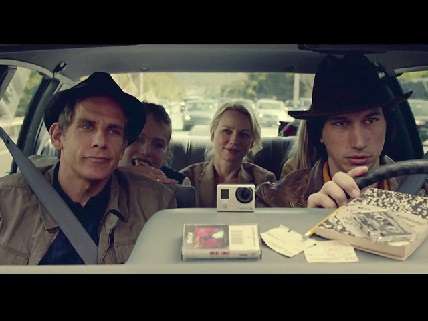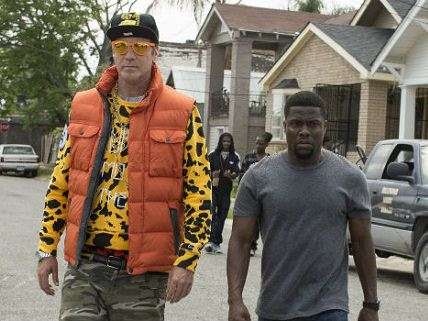Movie Reviews: While We're Young Might Be Baumbach's Best Yet, Get Hard Is Funny But Forgettable
Ben Stiller and Adam Driver in dueling generations. Will Ferrell and Kevin Hart in a familiar comedy raunch-fest.

Noah Baumbach's While We're Young might have been a simple takedown of the millennial generation, those feckless hipsters with their empty values and sense of boundless entitlement. You know: "These damn kids today."
But the movie is more complex than that. It focuses on Josh and Cornelia, two married New Yorkers who are surprised to find themselves in their mid-forties with the big dreams of their youth unfulfilled. Josh (Ben Stiller) is a documentary filmmaker. His first film, now obscure, was well-received, but he's spent the last 10 years grubbing for grant money to finish a followup. Cornelia (Naomi Watts), the daughter of an esteemed documentarian, Leslie Breitbart (Charles Grodin), once worked as a producer for her dad but now mainly provides loving support for her husband. She and Josh are childless, and they're okay with that; but their friends, all fellow 40-somethings, are awash in babies. Life is dull, dull, dull.
Then, while teaching a dinky continuing-education course in filmmaking, Josh is approached by another couple, Jamie (Adam Driver) and Darby (Amanda Seyfried). These two are in their mid-twenties, and they're full of fun and spontaneity. Their funky loft in Bushwick (where else?) is packed with retro-hip accoutrements: an old electric typewriter, a collection of VHS tapes, a wall full of vinyl records. Jamie seems to idolize Josh—he has actually seen his first film (he sought it out on eBay), and he wants to learn at the feet of this older director. Josh, starved for approval and admiration, falls right into the younger couple's vibrant lifestyle, bringing Cornelia along with him. Soon Darby is taking Cornelia to hip-hop dance classes, and Jamie is encouraging Josh to buy a stingy-brim fedora. Life is exciting again.
While we're sneering at Jamie and Darby's nitwit trendiness, the movie grows darker. Jamie isn't quite what he seems to be—he represents something new in the world, or at least the world as Josh has always known it. Josh is ponderously committed to "truth" and "objectivity" and the art of film. (He says things like "I'm trying to solve the problem that Eisenstein never solved.") But for Jamie, these concepts are quaint leftovers from an earlier, now-irrelevant era: truth is whatever you say it is, and objectivity is a lie.
In another sort of movie, we might expect Josh's traditional values to prevail in the end. But it's not that simple. With youthful vigor, Jamie is quickly assembling a film of his own—a film that Josh sees as a corruption of the documentary form. But everyone likes it, even Josh's revered father-in-law. And when Leslie finally sits through Josh's film—all six and a half hours of it—he pronounces the long-gestating project to be "seven hours too long." Josh is hurt and astonished. He determines to expose Jamie as the immoral careerist he actually is—a mission in which, again surprisingly, he both succeeds and fails.
This may be Baumbach's best movie. The script he has written has both depth of character and a vivid cultural specificity. And the lead actors do some of their best work. Stiller, who also played it straight in the director's 2010 Greenberg, once again mutes his penchant for compressed comical rage to portray a man whose most dearly held beliefs are being shredded before his eyes. And Watts is both moving and very funny (especially when trying to get down with the hip-hop kids) as a woman disoriented by her own mid-life confusion. Driver deploys his familiar hipster charisma to complex effect, and Seyfried is a minor revelation as a younger woman who's ambiguously uncommitted to much of anything at all.
Baumbach, now 40-something himself, presents these characters as flawed but still worthy in their own ways. He doesn't cut them any breaks, but he doesn't judge them too harshly either. The story concludes with a sigh of bittersweet generosity, which is also not what might normally be expected. It's very grown-up.

Get Hard
Let's see. The story is a blast of scattershot raunch? The star bares his pasty butt? Is it a Will Ferrell movie?
Yes it is. Get Hard uses its simpleton storyline—which could fit snugly on a pair of Post-it notes—as an armature on which to hang a series of raucous skits, few of them surprising but some of them very funny, in a scattershot way. Possibly in an effort to expand his audience in an "urban" direction, Ferrell has brought on Kevin Hart to costar—a wise decision. Hart's quick-witted comic presence is a welcome complement to Ferrell's familiar big-baby act. Still, this is a textbook example of a movie you're likely to forget before you make your way out of the theatre.
Ferrell is a stock trader named James, a rich idiot engaged to his boss' hot-but-conniving daughter (Alison Brie). James is baffled when he's unjustly arrested for fraud and embezzlement—he's innocent. But a judge decides to make an example of him and sentences him to 10 years in prison. And not some cushy Club Fed lockup, either—James will be going to San Quentin. Terrified by the prospect of a decade of jailhouse rape, James starts looking around for someone to coach him in ways to survive on the inside. He settles on Darnell (Hart), the owner of a car-wash service who's in need of a large cash infusion to build a better life for his wife and daughter. James has cash to infuse, and he figures Darnell is the right guy for his purposes because Darnell is black, and therefore must have spent time in prison himself. Ha ha.
The skits kick in. Darnell turns James's luxurious estate into a simulated prison. He tries to instruct James in how to make a "mad dog face" to scare away menacing cons. (James can only manage "sad-dogging.") He attempts to teach James how to fight the sort of multiple assailants he might face behind bars, but this doesn't go well either. James does succeed in one area, though—he learns how to conceal a shiv in his nether regions.
A number of early reviewers of this movie have decried its "homophobic" approach to the subject of jailhouse rape. I think they should lighten up—this is a venerable comic area. There is a scene in which James attempts to perform fellatio on a guy in a restroom stall that crawls right up to the cusp of the film's R rating. But then one of the most appealing characters in the picture is a flirtatious patron at a gay brunch spot. (He's played by Lyle R. Guidroz, an actor who has so far made a career of appearing uncredited in a number of movies. Guidroz has a sunny comic facility that deserves fuller recognition.)
The movie also makes room for rapper T.I. (Clifford Harris to his mom), a natural actor who owns every scene he's in. John Mayer puts in a nicely self-deprecating appearance, too, although it feels like a favor on somebody's part.
The script, by director Etan Cohen and Key & Peele veterans Jay Martel and Ian Roberts, gives Ferrell and Hart some crisp lines. ("When you were at Harvard, you ever get raped?" Darrell asks. James replies: "I think that was more of a Yale thing.") But most of the humor here is standard-issue "edgy." (Darrell teaches James how to pronounce "nigger," there's a fleeting reference to "Jew hair," and we see an occasional bare breast and flaccid penis.)
There's always been an audience for this sort of retro-potty-mouth movie, and no doubt there still is. How large it is at this point remains to be seen.


Show Comments (9)